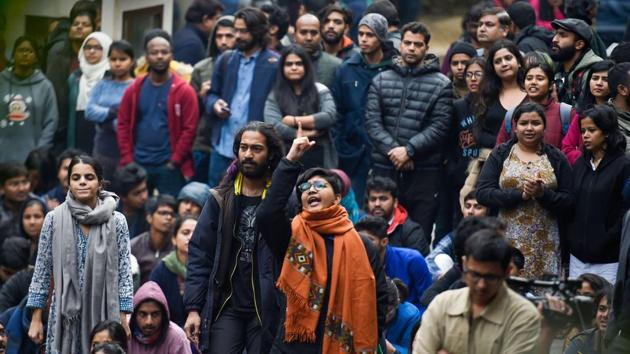Why university students have finally found a voice | Opinion
For four years, students have been grappling with the charge of being anti-national. They are now challenging it
The attack on Jawaharlal Nehru University (JNU) is a desperate attempt to silence the vanguard of a popular protest that is threatening the ruling regime’s ability to rule by consent. One way to understand what led us to the day when it became possible for armed men to brutally assault students and faculty in our universities is to realise that our students have been fighting a bigger war over the past four years.

Soon after the Delhi Police arrested JNU Students’ Union leader Kanhaiya Kumar in 2016, I met students, teachers, and officials across universities in Uttar Pradesh, from Aligarh Muslim University (AMU) to Benares Hindu University. I realised then that JNU was not the only university under attack.
Akhil Bharatiya Vidyarthi Parishad (ABVP) students protested against a sociology professor at Lucknow University for sharing a sympathetic article on Kanhaiya Kumar on Facebook. The first woman president of Allahabad University Students’ Union, Richa Singh, was abused and threatened by ABVP students in the presence of the vice-chancellor inside his office. At the Indian Institute of Technology (IIT) Kanpur, students wanted to talk about the suicide of Rohith Vemula and the treatment of Kashmiri students on their campus, but the administration made it clear that this was not acceptable. Aligarh’s Bharatiya Janata Party (BJP) mayor alleged that AMU’s canteen served beef and the local BJP MP, Satish Gautam, sent the university a letter warning against “anti-national and anti-government activities” on campus. Both students and faculty were afraid of a new atmosphere on campus that could label them “anti-national” for attending a film screening, sharing an editorial, even attending a discussion that criticised the ruling regime.
And yet, except for a few vocal students, it was hard for most students across these campuses to join the dots to make sense of a new political reality that would target all students, not just Kanhaiya Kumar and JNU. The country was being divided into two camps: Anti-national (anyone critical of the government, liberals, and Muslims) and nationalist (Modi supporters). The fact that students were active on social media did not help them find a voice to express their anger because mainstream media and social media were feeding them doctored videos and misinformation. A student at Lucknow University justified the government crackdown in JNU by showing doctored videos on his cellphone.
Speaking to AMU students outside the Maulana Azad Library, one got a sense that students and faculty were using these attacks to emphasise the historical role of universities as sanctuaries for knowledge and dissent. They were discussing and debating the meaning and history of nationalism. But how long could this form of resistance last when the government was clear that the only thing that mattered was whether a university was patriotic or anti-national?
Even as AMU students wrote dissertations on world literature and discussed multiculturalism in their classes, they came under attack, once again, for a portrait of Jinnah that had been hanging in the union hall since 1938. Aligarh’s BJP MP sent a letter to the university seeking the removal of the portrait. Later, Hindutva groups forcibly entered the university when former vice-president and AMU alumnus Hamid Ansari was going to give a lecture on Indian pluralism. Instead of covering the Right-wing’s smear campaign against AMU, sections of the mainstream media, particularly television channels, joined the government’s war against the university. Some television headlines read: “Azaadi slogans shouted at AMU”, “Why’s India’s enemy their ‘icon’”, “Is Jinnah an icon for young Muslims in India?”.
Two years ago, I think it would have been fair to read the Jinnah portrait controversy as Hindu nationalist politics as usual. Elections in UP were close and AMU was — and remains — a perfect scapegoat to polarise people along religious lines in the already polarised city of Aligarh. Most students outside AMU and JNU may not have paid attention to an emerging political context which was making India’s best public universities symbols of anti-nationalism.
Perhaps the Citizenship Amendment Act/National Register of Citizens is that piece of the puzzle that finally helped students find a voice to protest against something that they have been feeling all along. Because universities have always been political in India, it is not that it is only now that students are being politicised. Rather, the current student protests are an answer to a question that students have been asking for a long time.
Last year in February, along with a few faculty colleagues and students at Azim Premji University in Bengaluru, I organised a public reading and discussion of the work of human rights workers and scholars labelled by the government as “urban Naxals”. We discussed the importance of the need for public intellectuals who can show us the relationship between historical and ongoing injustice against the marginalised. But one student was not satisfied with our scholarly response to the crisis. “What can we students do when even you, our professors, don’t have a strategy of resistance?” Perhaps his own peers have answered his question.
Moyukh Chatterjee is a visiting scholar at Middlebury College and is working on an ethnography of majoritarian state formation in India
The views expressed are personal



